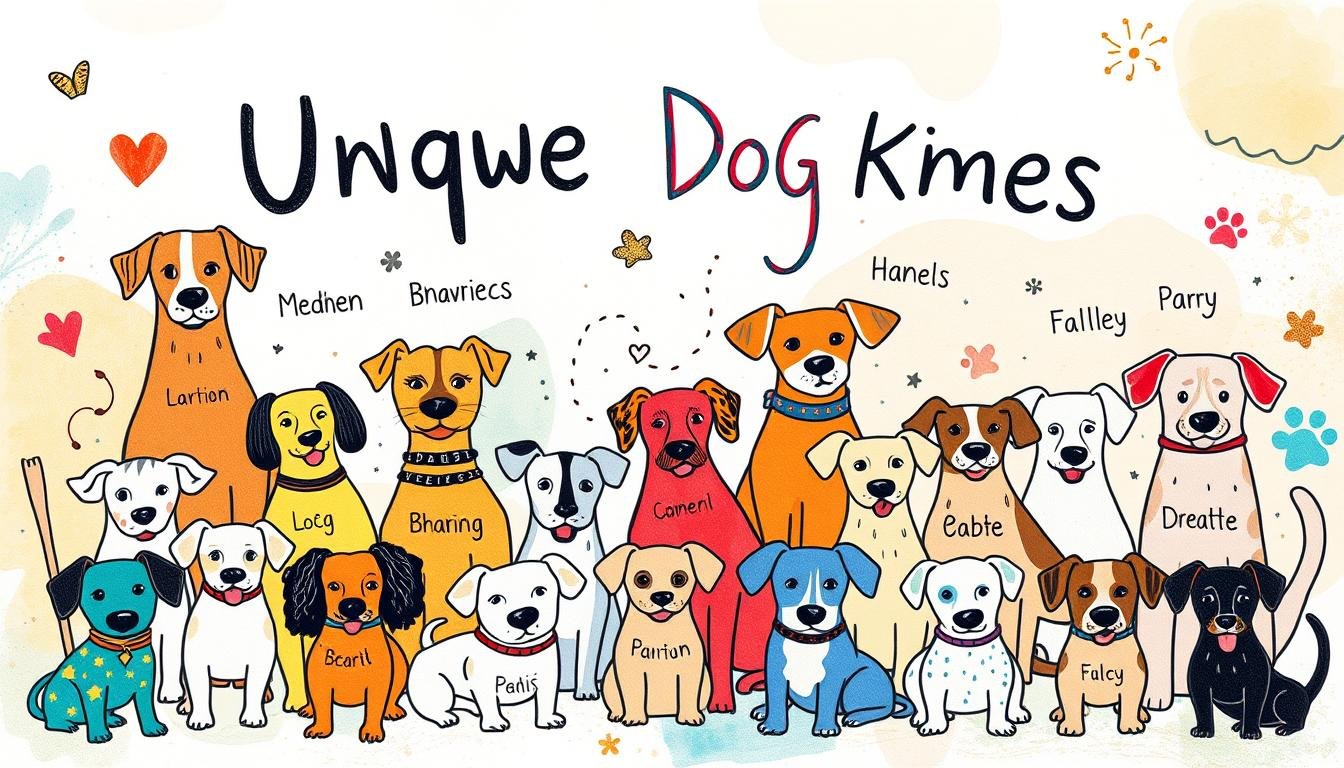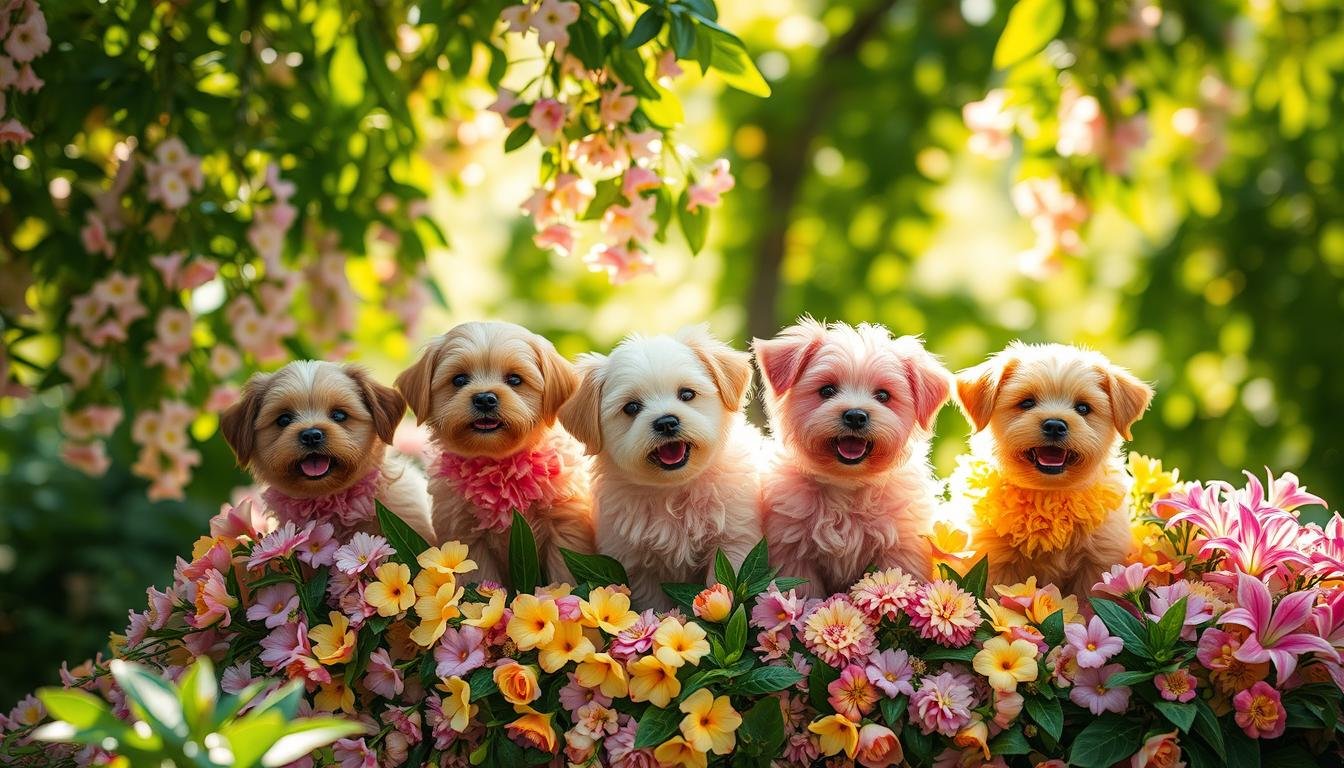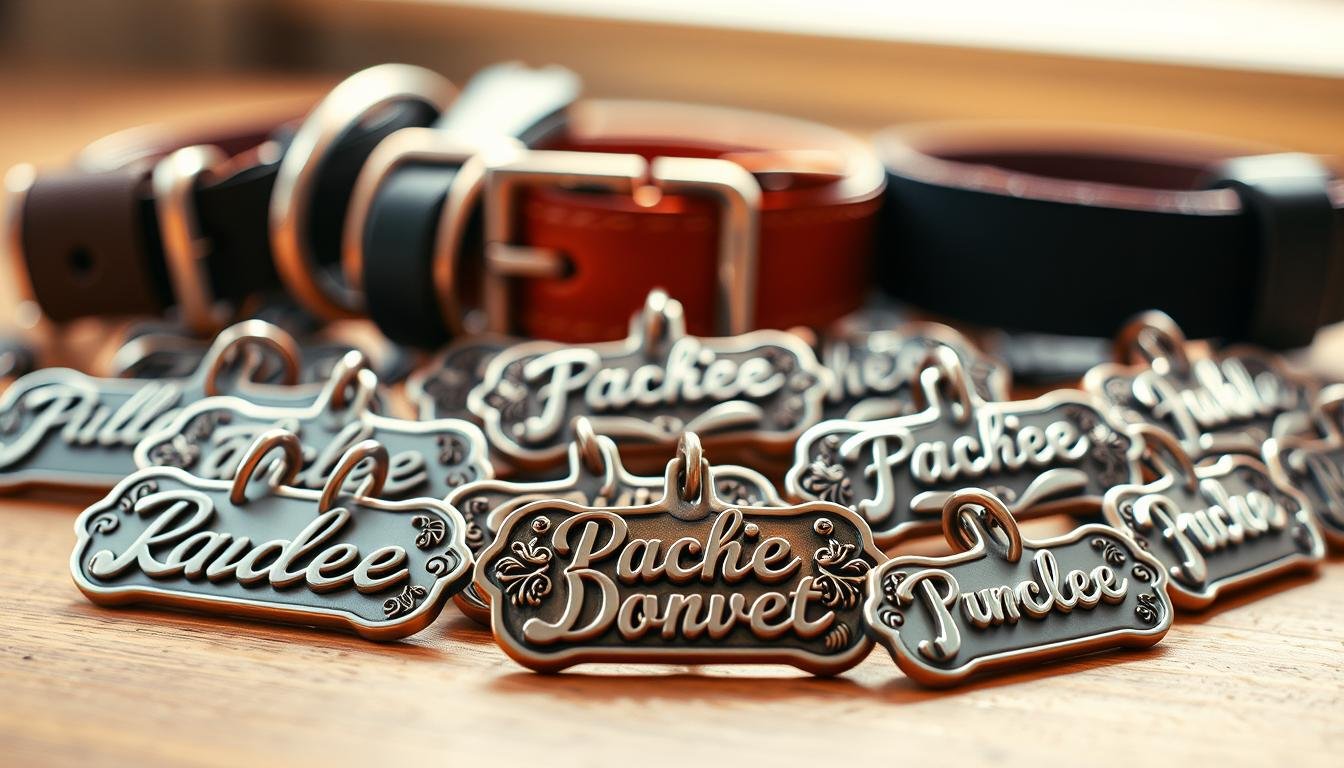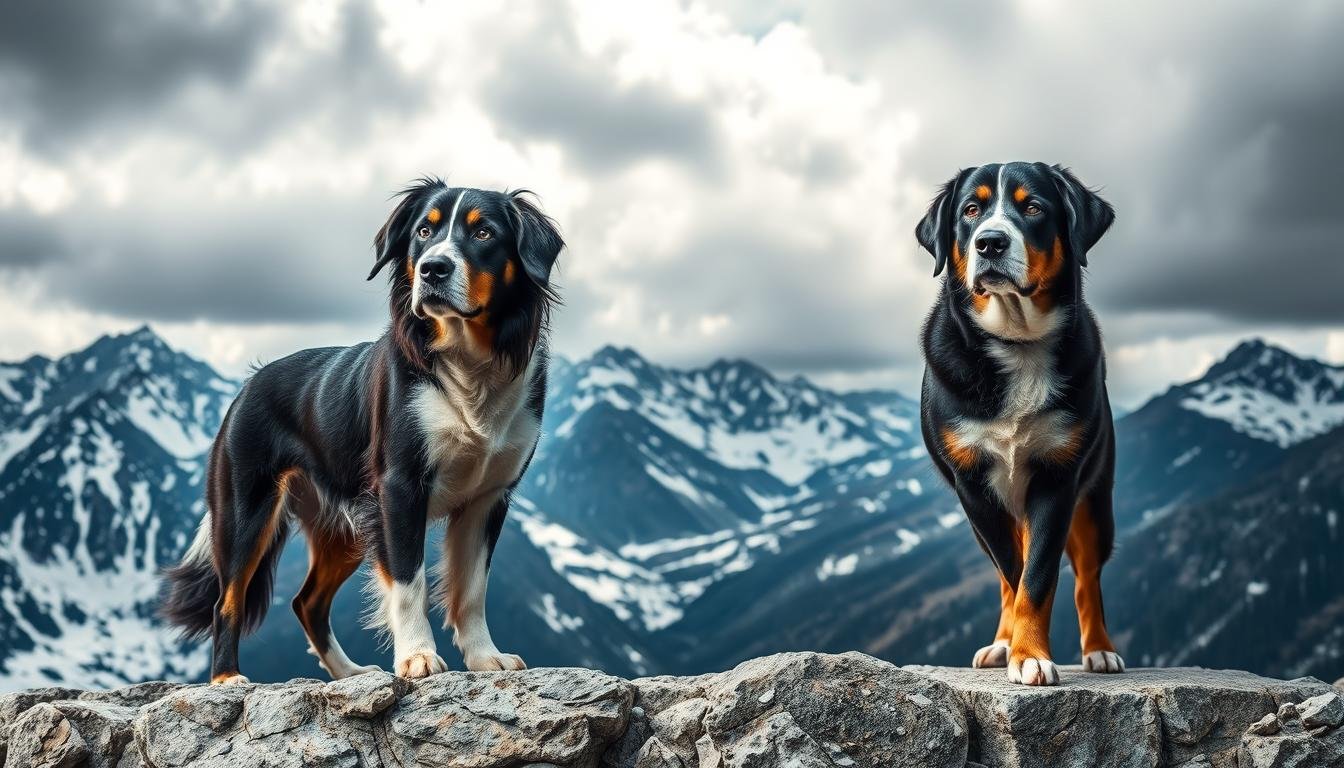Understanding the Significance of Unique Dog Names
Choosing a unique identifier for your pet can shape their identity and your bond. A personalized label goes beyond just calling them—it reflects their personality and strengthens your connection. When you pick something distinct, it helps your furry friend stand out in a crowd.
How a Unique Label Defines Personality
A creative choice for your pet’s label can make all the difference in their life. It’s not just about what sounds good; it’s about capturing their essence. For example, a playful pup might suit a lively, fun identifier, while a calm companion could have something serene.
“A pet’s label is more than a word—it’s a reflection of their spirit and your relationship.”
Strengthening the Bond
When you call your pet by a distinct identifier, it creates a special connection. It’s a way to show you’ve put thought into their identity. This small act can deepen the bond between you and your furry companion.
Avoiding Confusion in Public Spaces
Imagine calling your pet in a park filled with others. A generic label might lead to mix-ups, but a unique one ensures they respond only to you. This not only avoids confusion but also makes the experience more enjoyable for both of you.
Standing Out Socially
A distinct choice for your pet’s label makes them memorable in social settings. Whether it’s at the vet, a friend’s house, or a pet-friendly café, their identifier will leave an impression.
| Generic Labels | Unique Labels |
|---|---|
| Max | Zephyr |
| Bella | Luna |
| Charlie | Kai |
As you can see, a unique choice for your pet’s label can transform their identity and your relationship. It’s a small decision with a big impact.
History and Origin of the Name Koda
The history behind a label can reveal deep cultural and emotional connections. Understanding where a term comes from helps us appreciate its significance. This is especially true for names that carry rich traditions and meanings across different cultures.
Native American Roots
The term “Dakota” originates from Native American languages, specifically the Sioux tribe. It translates to “ally” or “friend,” reflecting values of companionship and loyalty. This meaning resonates deeply, making it a popular choice for those seeking a label with emotional weight.
Over time, “Dakota” evolved into shorter forms like Koda. This modern adaptation retains the original essence while offering a simpler, more contemporary feel. It’s a perfect example of how traditional terms can adapt to modern preferences.
Japanese Influence
Interestingly, Koda also has roots in Japanese culture. In Japanese, it can mean “harmony” or “peace,” adding another layer of depth to its significance. This dual cultural influence makes it a versatile and meaningful choice.
The blending of Native American and Japanese meanings creates a unique identity. It’s a label that bridges cultures, reflecting a global perspective in naming practices.
| Traditional Form | Modern Adaptation |
|---|---|
| Dakota | Koda |
| Meaning: Ally/Friend | Meaning: Harmony/Peace |
This table highlights the evolution of the term, showing how it has transformed while retaining its core values. Whether you choose the traditional or modern form, the essence remains the same—a celebration of connection and identity.
Decoding the koda name for dog
Exploring the layers of meaning behind a pet’s identifier can reveal fascinating cultural and mythological ties. These connections not only add depth to the identifier but also reflect the values and stories we associate with our furry companions. By understanding these layers, we can appreciate the significance of our choices even more.
Cultural and Mythological Connections
Mythology has always played a role in shaping the way we think about identifiers. For example, in Greek mythology, figures like Zeus symbolize strength and leadership. These traits resonate with the loyalty and protectiveness we often see in our pets. By drawing parallels between mythic figures and our companions, we can create a deeper bond.
Cultural origins also influence modern naming practices. Many identifiers carry meanings rooted in traditions, such as the Native American term “Dakota,” which signifies friendship. This blending of cultural and mythological elements enriches the identifier, making it more than just a word—it becomes a story.
“A pet’s identifier is a bridge between ancient traditions and modern connections.”
When we choose an identifier with cultural or mythological significance, we’re not just naming a pet—we’re honoring a legacy. This approach adds layers of meaning, making the identifier a reflection of both the pet’s personality and the values we hold dear.
| Mythological Figure | Symbolic Meaning | Connection to Pets |
|---|---|---|
| Zeus | Strength, Leadership | Loyalty, Protectiveness |
| Athena | Wisdom, Strategy | Intelligence, Alertness |
| Apollo | Light, Healing | Comfort, Companionship |
This table illustrates how mythological figures can inspire meaningful identifiers for pets. By drawing from these rich traditions, we create identifiers that are not only unique but also deeply symbolic.
Comparing Koda with Dakota: A Personal Perspective
Deciding between two similar yet distinct labels for your pet can be a meaningful journey. When I faced the choice between Dakota and Koda, it wasn’t just about spelling—it was about identity, tradition, and personal connection. This decision taught me how a small choice can carry significant weight.
Navigating the Spelling Dilemma
At first, I leaned toward Dakota because of its rich cultural roots. It means “ally” or “friend,” which felt perfect for my loyal companion. However, my family had mixed opinions. Some preferred the traditional form, while others thought Koda sounded more modern and unique.
As a boy who loves simplicity, I found Koda easier to pronounce and remember. It also felt like a fresh take on a classic, blending tradition with a modern twist. This balance resonated with me, and I knew it was the right choice.
Reflecting on this dilemma, I realized how much family expectations and personal taste influence such decisions. It’s not just about what sounds good—it’s about what feels right for your pet and your relationship with them.
Here’s a quick comparison of the two labels:
| Dakota | Koda |
|---|---|
| Traditional | Modern |
| Meaning: Ally/Friend | Meaning: Harmony/Peace |
| Longer, more formal | Shorter, simpler |
Ultimately, I chose Koda because it reflected my desire for uniqueness while honoring its cultural roots. It’s a label that feels personal and meaningful, just like my bond with my furry companion.
If you’re facing a similar decision, consider your pet’s personality and your own preferences. Whether you go traditional or modern, the most important thing is that the label feels right for both of you.
Trends in Dog Naming: A Listicle of Unique Choices
Naming trends for pets are evolving, reflecting creativity and personal connections. From food-inspired labels to mythological references, pet owners are embracing unique choices that stand out. This list highlights some of the most creative and trend-setting options to inspire your next decision.
Food and Nature-Inspired Names
One of the most popular trends is drawing inspiration from food and nature. Labels like Mocha, Basil, and Pepper are gaining traction. These choices not only sound appealing but also reflect a connection to everyday life and the environment.
For example, a playful pup might suit Cookie, while a calm companion could be named Willow. These labels are simple yet meaningful, making them a favorite among pet owners.
Mythology and Modern Trends
Mythological references are another growing trend. Names like Zeus, Athena, and Apollo carry rich histories and symbolic meanings. They resonate with the loyalty and strength we often see in our furry friends.
Modern pop culture also plays a role. Labels inspired by movies, books, and TV shows are becoming increasingly popular. For instance, Arya (from Game of Thrones) or Finn (from Star Wars) are great examples of this trend.
| Food-Inspired | Nature-Inspired | Mythological |
|---|---|---|
| Mocha | Willow | Zeus |
| Basil | River | Athena |
| Pepper | Sky | Apollo |
These trends show how pet owners are personalizing labels to reflect their pets’ personalities and their own interests. Whether you choose a food-inspired label or a mythological reference, the key is to pick something that feels right for your pup.
My Top Picks for Dog Names with a Twist
Unconventional choices for pet labels are gaining popularity for their uniqueness. In this section, I’ll share my favorite options that break the mold of common picks. These labels combine creativity, personality, and a touch of the unexpected.
Unique and Uncommon Options
When it comes to selecting a label, I lean toward choices that stand out. Here’s my curated list of unconventional options:
- Nimbus: Inspired by clouds, this label is perfect for a fluffy, dreamy companion.
- Fizzgig: A playful and quirky choice for an energetic pet.
- Oolong: Drawing from tea varieties, this label is both unique and soothing.
- Galaxy: Ideal for a pet with a larger-than-life personality.
- Topanga: A nod to nature and nostalgia, this label feels warm and inviting.
These labels not only sound distinctive but also add a layer of personality to your pet’s identity. They’re perfect for those who want to move beyond the usual picks.
Blending Cuteness with Distinctiveness
One of my favorite aspects of unconventional labels is how they balance cuteness with uniqueness. For example, Waffles is a humorous yet adorable choice, while Buttercup brings a timeless charm. These labels feel personal and memorable, making them stand out in any setting.
I’ve noticed that labels like these often spark conversations. Whether it’s at the park or a friend’s house, they leave a lasting impression.
The Appeal of Person-Inspired Labels
Another trend I love is using labels that feel more like person labels. Names like Charlie or Lucy are classic, but options like Finn or Arya add a modern twist. These choices create a sense of familiarity while still being unique.
For instance, I once met a girl who named her pet Harper. It felt like the perfect fit for her playful and intelligent companion. This approach shows how labels can reflect both the pet’s personality and the owner’s style.
Personal Anecdotes and Encouragement
When I named my own pet, I wanted something that felt special. After much thought, I settled on Zephyr, inspired by a gentle breeze. It’s a label that’s both unique and meaningful, and it suits my pet perfectly.
I encourage you to think outside the box when choosing a label. Whether you draw inspiration from nature, mythology, or everyday life, the key is to pick something that feels right for your furry friend.
Rising Popularity of Dog Names in the United States
Recent data reveals fascinating trends in how owners label their furry companions. Every year, new patterns emerge, reflecting shifts in culture, media, and personal preferences. As a pet owner and naming enthusiast, I’ve been closely following these changes, and the insights are both surprising and enlightening.
Insights from Recent Rankings
In 2023, certain labels have climbed to the top spot in popularity rankings. For example, Bella and Luna continue to dominate, while names like Koda are gaining traction. These trends aren’t just random—they often mirror broader cultural influences, from movies to social media.
What’s interesting is how these choices vary by region. In Alaska, Koda ranks in the top five, while in California, Coco holds a strong position. This regional diversity shows how local culture and preferences shape labeling decisions.
Annual Trends and Fluctuations
Every year, we see names rise and fall in popularity. For instance, Loki surged in 2020, likely due to its connection to Marvel’s cinematic universe. Similarly, Finn has become a favorite, inspired by both Irish mythology and pop culture.
These fluctuations highlight how pet owners are influenced by the world around them. Whether it’s a trending TV show or a beloved book, the labels we choose often carry deeper meanings.
Cultural Reflections in Label Choices
Labels like Zeus and Athena reflect a growing interest in mythology, while Mocha and Oreo show a playful connection to everyday life. These choices aren’t just about sound—they’re about identity and storytelling.
As a pet owner, I’ve noticed how these trends evolve. What starts as a unique choice can quickly become a top spot contender, thanks to social media and word of mouth.
| Popular Labels in 2023 | Trending Influences |
|---|---|
| Bella | Timeless appeal |
| Luna | Celestial themes |
| Koda | Cultural roots |
| Finn | Mythology and pop culture |
These trends show how labeling choices are more than just personal—they’re a reflection of the times we live in. Whether you’re inspired by tradition or innovation, the label you choose tells a story.
Exploring the Cultural Impact of Dog Names
Celebrities and media have a surprising influence on how we choose labels for our furry friends. From Instagram posts to Hollywood blockbusters, the world of pet identifiers is shaped by popular culture. This section dives into how these factors shape trends and create globally recognized labels.
How Media Shapes Pet Label Trends
Social media platforms like Instagram play a huge role in highlighting unique pet identifiers. A single photo of a celebrity’s pet can spark a trend. For example, when Taylor Swift shared a photo of her cat named Meredith, the label surged in popularity.
Movies and TV shows also leave their mark. After the release of Frozen, the label Elsa became a top choice for pets. These examples show how media exposure can turn a simple identifier into a global phenomenon.
Celebrity Influence on Pet Labels
Celebrities often set trends with their creative choices. Names like Beyoncé, Kobe, and Gandalf have become popular thanks to high-profile pet owners. These labels not only reflect the owner’s personality but also give pets a unique social image.
For instance, Oprah’s pets have names that exude elegance and strength. This influence extends beyond the world of celebrities, inspiring everyday pet owners to think outside the box.
The Role of Social Media in Naming Trends
Platforms like TikTok and Instagram amplify the reach of unique labels. A viral photo or video can make a label go from obscure to mainstream overnight. This is especially true for labels inspired by rainbow themes or other visually striking concepts.
For example, a rainbow-themed pet account might inspire names like Skittles or Aurora. These labels gain traction quickly, thanks to the power of social media.
Global Recognition Through Media
Some labels become globally recognized through media exposure. Take Lassie, for example. This label is synonymous with loyalty and intelligence, thanks to the iconic TV show. Similarly, Beethoven has become a popular choice for large, lovable pets.
These examples show how media can elevate a label from a simple identifier to a cultural symbol.
Shaping a Pet’s Social Image
The label you choose can shape how others perceive your pet. A unique identifier like Zeus or Athena conveys strength and wisdom. On the other hand, playful labels like Cookie or Pepper highlight a pet’s fun-loving nature.
This social image can influence interactions at parks, vet visits, and even on social media. A well-chosen label ensures your pet stands out in the world.
In conclusion, media and celebrity culture play a significant role in shaping pet label trends. From viral photos to high-profile examples, these influences create a rich tapestry of choices for pet owners. By understanding these trends, you can choose a label that reflects your pet’s personality and your own style.
Tips for Choosing the Perfect Dog Name
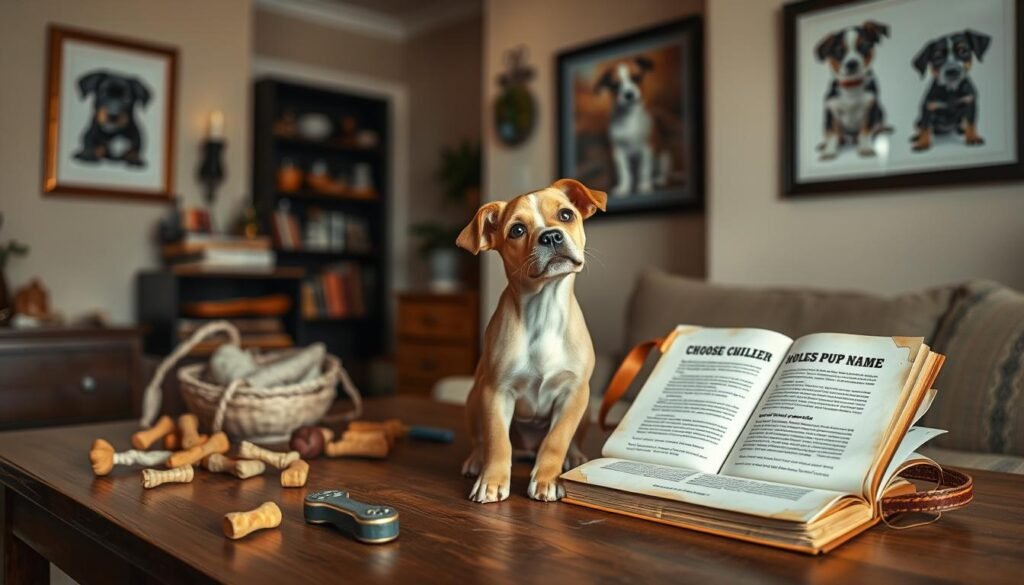
Finding the right label for your furry companion can be both fun and meaningful. It’s not just about picking something that sounds good—it’s about creating a connection that lasts. Here are some practical tips to help you make the best choice.
Considering Personality and Breed
Your pet’s personality and breed play a big role in selecting the right label. A playful pup might suit something lively, while a calm companion could have a serene choice. For example, a Labrador might fit a strong, bold label, while a Chihuahua could have something cute and quirky.
I’ve found that observing your pet’s behavior can inspire the perfect label. Think about their energy, quirks, and habits. This approach ensures the label feels personal and meaningful.
Balancing Tradition with Innovation
While traditional labels like Max or Bella are timeless, innovative choices can make your pet stand out. I recommend blending the two—drawing from classic roots while adding a modern twist. For instance, a person name like Charlie can feel familiar, while a unique option like Zephyr adds creativity.
When I chose a label for my pet, I tested several options to see which felt right. Saying them out loud helped me gauge clarity and ease of use. This method ensures the label is both meaningful and practical.
Here’s a quick comparison of traditional and innovative labels:
| Traditional | Innovative |
|---|---|
| Max | Zephyr |
| Bella | Luna |
| Charlie | Kai |
Testing the Sound and Clarity
Short, clear labels are essential for effective training. I’ve found that one or two syllables work best, as they’re easy for pets to recognize. Avoid labels that sound like commands, such as “Kit” (which could be confused with “sit”).
I also recommend involving your child or family in the process. Their input can add a personal touch and make the label feel more special.
Strengthening the Bond Through Training
A well-chosen label can make training easier and strengthen your bond. When your pet responds to their label, it creates a sense of connection and trust. I’ve seen how a clear, meaningful label can enhance communication and make everyday interactions smoother.
In conclusion, selecting the right label is a blend of creativity, practicality, and personal connection. By considering your pet’s personality, testing options, and focusing on clarity, you can find a label that’s perfect for both of you.
Personal Experiences and Stories Behind Dog Names
Naming my furry companion was a journey filled with emotions and memories. It wasn’t just about picking a label—it was about capturing the essence of who they are. Every moment spent with my pet shaped the decision, making it deeply personal and reflective.
Memorable Moments in Naming My Dog
When I first brought my companion home, I knew I wanted a label that reflected their personality. I spent days observing their quirks and habits. One evening, as we played in the backyard, it hit me—the perfect choice. It felt like I truly knew my dog in that moment.
The bond we share played a huge role in the decision. My pet isn’t just an animal; they’re my companion, my confidant. I wanted a label that honored that connection. It wasn’t just about what sounded good—it was about what felt right.
“A pet’s label is a reflection of their spirit and your relationship with them.”
Everyday moments reaffirmed the uniqueness of the chosen label. Whether it was their excited bark when I came home or their gentle nudge for attention, the label fit perfectly. It became a part of their identity, a word that carried meaning beyond its letters.
Here’s a quick look at how my feelings evolved during the naming process:
| Stage | Thoughts and Feelings |
|---|---|
| Initial Days | Observing behavior, testing options |
| Moment of Clarity | Finding the perfect fit |
| Everyday Moments | Reaffirming the choice |
In the end, naming my pet was more than just a decision—it was a celebration of our bond. It’s a reminder of the moments we’ve shared and the journey we’re on together. When you truly know your dog, the right label comes naturally.
Incorporating Family and Tradition in Naming Your Dog
Family traditions can add a layer of meaning to the process of naming your furry friend. When you draw from your heritage, the label becomes more than just a word—it becomes a story. This approach connects your pet to your roots and creates a sense of continuity.
Generational influences often reflect the age-old traditions of a family. For example, many popular baby names from the past have found their way into pet labels. This trend shows how families value passing down meaningful identifiers.
There’s a lot to consider when blending heritage with modern trends. One way to do this is by adapting traditional names to fit a contemporary style. For instance, a classic name like Elizabeth could become Ellie for a playful companion.
Here are some examples of how traditional elements have inspired my favorite labels:
- Arthur: A nod to legendary kings, perfect for a noble and loyal pet.
- Maeve: Inspired by Irish mythology, ideal for a spirited and independent companion.
- Leo: A timeless choice that reflects strength and courage.
I encourage you to consider stories from your own family when choosing a label. Think about names that hold significance or evoke cherished memories. This personal touch can make the label even more special.
Balancing heritage with a contemporary twist is key. Here’s a quick guide to help you navigate this process:
| Traditional Name | Modern Adaptation |
|---|---|
| William | Liam |
| Margaret | Maggie |
| Joseph | Joey |
In conclusion, incorporating family traditions into your pet’s label can create a deeper connection. Whether you choose a classic name or a modern adaptation, the key is to pick something that feels meaningful to you and your furry friend.
Name Evolution: From Birth to Adulthood
As your pet grows, their identity evolves, and so can the label you choose for them. What fits a playful puppy might not suit a calm adult. This journey of naming is as dynamic as your furry friend’s personality.
Adapting the Label as Your Pet Grows
When I first brought my companion home, I chose a label that matched their playful energy. It felt like a game, picking something fun and lively. But as they grew, their personality shifted, and so did the label’s relevance.
For example, a label inspired by Greek mythology might highlight timeless qualities like strength or wisdom. These traits often persist throughout life, making the label a lasting choice. However, subtle tweaks can ensure it remains a perfect fit.
I’ve noticed that playful aspects, like a game, mirror a pup’s early energy. But as they mature, their behavior changes. Observing these shifts can inspire adjustments to their label, ensuring it always feels right.
Personal Reflections on Label Evolution
My own experience taught me how a label can evolve. Initially, I chose something that reflected my pet’s playful nature. Over time, as they grew calmer and more loyal, I felt the need to adapt it slightly.
This process wasn’t just about changing a word—it was about honoring their growth. It reminded me of how Greek legends often evolve, yet their core essence remains. The same applies to a pet’s label.
| Puppy Stage | Adult Stage |
|---|---|
| Playful, energetic | Calm, loyal |
| Short, fun labels | Timeless, meaningful labels |
In conclusion, the label you choose for your pet isn’t set in stone. It can grow and change, just like they do. By observing their personality and adapting as needed, you can ensure it always feels perfect.
Behind the Scenes: How I Settled on Koda
Deciding on the right spelling for my pet’s label was a journey filled with thoughtful consideration. It wasn’t just about picking a word—it was about finding something that felt right for both of us. The process involved weighing options, reflecting on personal preferences, and navigating moments of doubt.
Spelling Dilemma: Koda vs. Dakota
One of the biggest challenges I faced was choosing between Koda and Dakota. Both options had their merits, but they also came with unique considerations. Dakota felt traditional and rooted in cultural significance, while Koda offered a modern, simplified twist.
I remember asking someone close to me for their opinion. They pointed out that Koda was easier to pronounce and had a friendly, approachable vibe. This feedback made me reconsider my initial preference for Dakota.
There were moments when I doubted my choice. Would Koda lose its meaning without the full spelling? I realized that the essence of the label mattered more than its length. It wasn’t about what others thought—it was about what felt right for my pet and me.
Personal Preferences and Practical Considerations
My personal preferences played a significant role in the decision. I wanted something that reflected my pet’s personality and our bond. Koda felt like a perfect fit—it was short, memorable, and carried a sense of warmth.
Practicality was another factor. I thought about how the label would sound in everyday situations. Would it be easy to call out at the park? Would it stand out in a crowd? Koda checked all these boxes, making it a practical choice.
| Dakota | Koda |
|---|---|
| Traditional | Modern |
| Longer, formal | Short, friendly |
| Cultural roots | Simplified adaptation |
Moments of Doubt and Clarity
There were times when I questioned my decision. Was I overthinking it? I reminded myself that this label would be a part of our daily lives. It needed to feel natural and meaningful.
One day, while playing with my pet, I called out Koda, and they responded immediately. That moment of clarity confirmed my choice. It wasn’t just a label—it was a reflection of our connection.
The Outcome
In the end, I chose Koda because it felt right. It captured my pet’s personality and our bond. The spelling might be simple, but its meaning is profound. It’s a reminder of the thoughtful journey that led me to this decision.
Choosing a label for your pet is a personal process. It’s about finding something that resonates with you and your furry companion. Whether you go traditional or modern, the most important thing is that it feels right.
Unique Dog Name Trends to Watch in the Future
The world of pet labels is constantly evolving, with new trends emerging that reflect cultural shifts and personal creativity. As pet owners seek to express individuality, the way we choose labels for our furry friends is becoming more innovative and diverse.
Emerging Naming Conventions
One of the most exciting trends is the rise of beach-inspired labels. Names like Breeze, Wave, and Sandie are gaining popularity, reflecting a love for coastal living and nature. These labels evoke a sense of calm and freedom, making them perfect for pets with a laid-back personality.
Another trend is the creative process of making name moments. Pet owners are crafting unique labels by blending words, sounds, or even cultural references. For example, combining Luna and Sky to create Lunasky adds a personal touch that feels special and meaningful.
Cultural shifts are also influencing naming conventions. With a growing interest in sustainability, labels inspired by nature and the environment are on the rise. Names like Willow, River, and Oak reflect a connection to the earth and its resources.
Looking ahead, I predict that future naming conventions will continue to innovate. Pet owners might draw inspiration from technology, space, or even abstract concepts. The key is to experiment and find a label that resonates with your pet’s unique personality.
Here are some tips to inspire your creativity:
- Think outside the box—consider unconventional sources like literature, art, or travel.
- Involve your family in the process to create a label that feels personal and shared.
- Test the sound and clarity of the label to ensure it’s easy to call out in public spaces.
“A pet’s label is more than a word—it’s a reflection of their spirit and your relationship.”
In conclusion, the future of pet labeling is bright and full of possibilities. By embracing trends like beach-inspired themes and the creative process of making name moments, you can choose a label that’s as unique as your furry friend.
Conclusion
The bond between a pet and its owner is often reflected in the label they share. Throughout this article, I’ve explored how a thoughtful choice goes beyond mere identification—it tells a story. From cultural roots to personal connections, each label carries meaning that strengthens the relationship.
Choosing a unique identifier is not just about standing out; it’s about creating a lasting impression. Whether inspired by nature, mythology, or personal experiences, the right label can deepen the bond. It’s a small decision with a big impact.
I encourage you to use the tips and trends shared here to find the perfect fit. Remember, the most important story is the one you share with your furry companion. At the end of the day, it’s the bond that truly matters.

